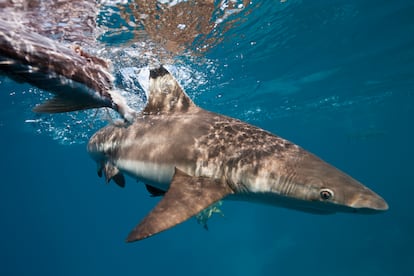Science debunks the ‘killer shark’ myth: Most bites are a self-defense reflex
A new analysis suggests that a total of 322 bites worldwide occurred when the large fish felt intimidated by humans

For decades, sharks have been portrayed as serial killers. The bad reputation sharks carry is disproportionate to the number of attacks they perpetrate on humans. Around 100 bites are typically recorded each year worldwide, and 10% of them are fatal. This scenario is very different from that portrayed in the legendary 1975 film Jaws, which fueled an unfair stigma that persists to this day. Feared by most people, the truth is that this large, timid fish that moves stealthily through the sea and rarely hunts in packs doesn’t just bite to defend its territory and compete with its peers. The survival instinct is another additional factor: these bites are a self-defense mechanism linked to a previous action committed by a human, which the animal interprets as aggression.
This is according to a study led by Eric E. Clua, a researcher at the University of Paris Sciences and Letters, published on April 25. This new analysis, which compares global observations with others conducted in French Polynesia due to its abundant marine life, highlights this little-studied variable that triggers shark bites: self-defense. The injuries are superficial because the animal is not seeking food, but rather its own protection: it is not lethal, although it is violent. Food-seeking bites are characterized by significant removal of flesh and high mortality due to hemorrhage. “Whether intentional or not, people are responsible for these bites. Even simply by being in the sea, which is the shark’s realm,” Clua explains to EL PAÍS.
Although defensive behavior has been observed in large birds such as cassowaries and terrestrial mammals such as bears, it has not been documented in detail in sharks. To do so, the researchers compared shark bites from the Global Shark Attack File database, with approximately 7,000 recorded bites since 1863. They focused on bites related to activities that could bring people close to sharks — spearfishing and other activities that invade their territory — and distinguished between provoked and unprovoked.
The findings, published in the journal Frontiers in Conservation Science, indicate that a total of 322 bites worldwide could have been motivated by self-defense, with a fatality rate of 3.2%. They are primarily inflicted by medium-sized coastal shark species (less than 3 meters long), such as the blacktip reef shark (Carcharhinus melanopterus) or the grey reef shark (Carcharhinus plumbeus).
Shark bites have been recorded in the 118-island Polynesian archipelago since 1940. However, records from the Island Research Center and Environmental Observatory that include reliable information begin later: between 2009 and 2023. During those 15 years, 74 bites were documented, four of them in self-defense, giving a prevalence of 5%.
In French Polynesia, there are activities that provoke this self-defense behavior, such as trap fishing (for bluefin tuna) and spear fishing (which is done with a hook), which are not common elsewhere. But other types of fishing, such as recreational fishing — very popular in countries like the U.S. and Australia — can also provoke these bites, so “the comparison is legitimate, albeit indirect,” adds the lead author of the study. Accurately collecting this data on a global scale remains difficult.
Certain species of benthic sharks (such as the carpet shark in Australia) may react instinctively when people unintentionally walk over them because they tend to settle on the sand, like rays. “It’s advisable not to go to the aid of a shark in danger, as it won’t necessarily perceive this human action positively,” the expert says.
None of the bites analyzed were preceded by abnormal agonistic behavior (aimed at harming another shark), such as lowering the chest or swimming in a hunched position. The scientists in the study question the practice of labeling all self-defense bites as “attacks.”
Among the most endangered animals
For some cultures, such as Polynesia, sharks are considered sacred animals or tāura totems and guardians of the islands. They are navigators who play an important role in people’s lives and cultures. This perspective has historically limited their exploitation in that part of the world.
Sharks in Polynesia are protected, although local fishermen don’t always respect this regulation. In general, island traditions integrate nature and culture, linking the spiritual and human worlds. It is said that all marine elements are descendants of the god Tangaroa, who allowed the first life on the atolls, ring-shaped islands sunk in the ocean and surrounded by coral reefs.
Despite increasing global protection measures, they are among the world’s most endangered animals, for several reasons: the demand for their fins is a very lucrative business in Asia, coupled with bycatch and the growing market for shark meat, which has led to the deaths of millions of these animals.
Sign up for our weekly newsletter to get more English-language news coverage from EL PAÍS USA Edition
Tu suscripción se está usando en otro dispositivo
¿Quieres añadir otro usuario a tu suscripción?
Si continúas leyendo en este dispositivo, no se podrá leer en el otro.
FlechaTu suscripción se está usando en otro dispositivo y solo puedes acceder a EL PAÍS desde un dispositivo a la vez.
Si quieres compartir tu cuenta, cambia tu suscripción a la modalidad Premium, así podrás añadir otro usuario. Cada uno accederá con su propia cuenta de email, lo que os permitirá personalizar vuestra experiencia en EL PAÍS.
¿Tienes una suscripción de empresa? Accede aquí para contratar más cuentas.
En el caso de no saber quién está usando tu cuenta, te recomendamos cambiar tu contraseña aquí.
Si decides continuar compartiendo tu cuenta, este mensaje se mostrará en tu dispositivo y en el de la otra persona que está usando tu cuenta de forma indefinida, afectando a tu experiencia de lectura. Puedes consultar aquí los términos y condiciones de la suscripción digital.









































